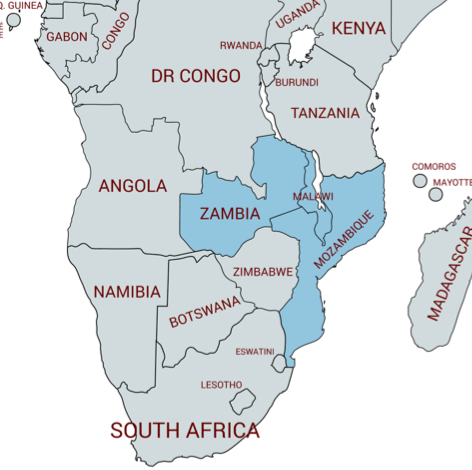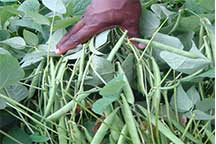Genetic Improvement of Dry Beans for Bruchid Resistance for Southern Africa
Principal investigator/Lead institution: Dr. Juan M. Osorno, North Dakota State University
Collaborating institutions: University of Nebraska, U.S.
University of Zambia (UNZA), Zambia
Dept. of Agricultural Research and Technical Services (DARTS), Malawi
Instituto de Investigação Agraria de Mozambique (IIAM), Mozambique
Works in: Malawi, Mozambique, Zambia

Project overview
The Southern Africa countries of Zambia, Malawi, and Mozambique have some of the highest levels of poverty and malnutrition not only within Africa but worldwide. Agriculture is an important economic activity and among all the crops grown, common bean (Phaseolus vulgaris L.) is one the staple crops in terms of both production and consumption.
Southern Africa accounts for ~32% of the total production of common bean in the African continent. Despite the economic and nutritional importance of common bean in southern Africa, seed yields remain low, ranging between 450-600 kg ha. Both biotic and abiotic stresses are the main causes of significant losses that don’t allow the crop to reach potential seed yields and also decrease quality of the grain harvested.
In addition, bean weevils (a.k.a. bruchids) are a post-harvest pest responsible for over 48% loses in quality and quantity of common bean in storage. Only until recent years, bean breeders were able to develop germplasm with resistance to the 2 main species of bruchids.
This represents a new and unique opportunity to transfer the resistance (known as the APA locus) into commercial varieties with good agronomic performance and in market classes of high acceptability in the South African region. Insecticides are available but they are expensive and extremely toxic. In addition, chemical control is less practiced in Africa because small-scale farmers cannot afford pesticides.

Therefore, development and use of weevil-resistant varieties would be the most economical and environmentally friendly control method for smallholder farmers in the region. The University of Zambia Bean Breeding Program has developed 11 breeding populations for resistance to common bean weevil involving parents with commercial seed types acceptable in the region. All these breeding populations are currently at mid-generation stages. Additionally, some of these 11 breeding populations have resistance for economically-important diseases (ANT, ALS and CBB) and low soil fertility.
This project will aim to continue testing and selecting this genetic material to develop new bruchid-resistant varieties with good agronomic performance, increasing selection efficiency using modern molecular tools, and improved cooking time.
These activities will have direct economic impact in the region not only by offering a new product that can be stored by longer periods of time without losing quality, but also by allowing households to store beans they can eat safely (food security).
In addition, the project will improve the technical knowledge of bean smallholder farmers, bean scientists, and other stakeholders in the region through training the next generation of plant scientists (breeders) for the region.
Click here to download the Project Fact Sheet
Want to learn more?
Presentation at the 2022 Global Legume Lab Convening. Additional presentation at the 2022 Global Legume Lab Convening. Presentation at the 2021 Global Legume Lab Convening.



